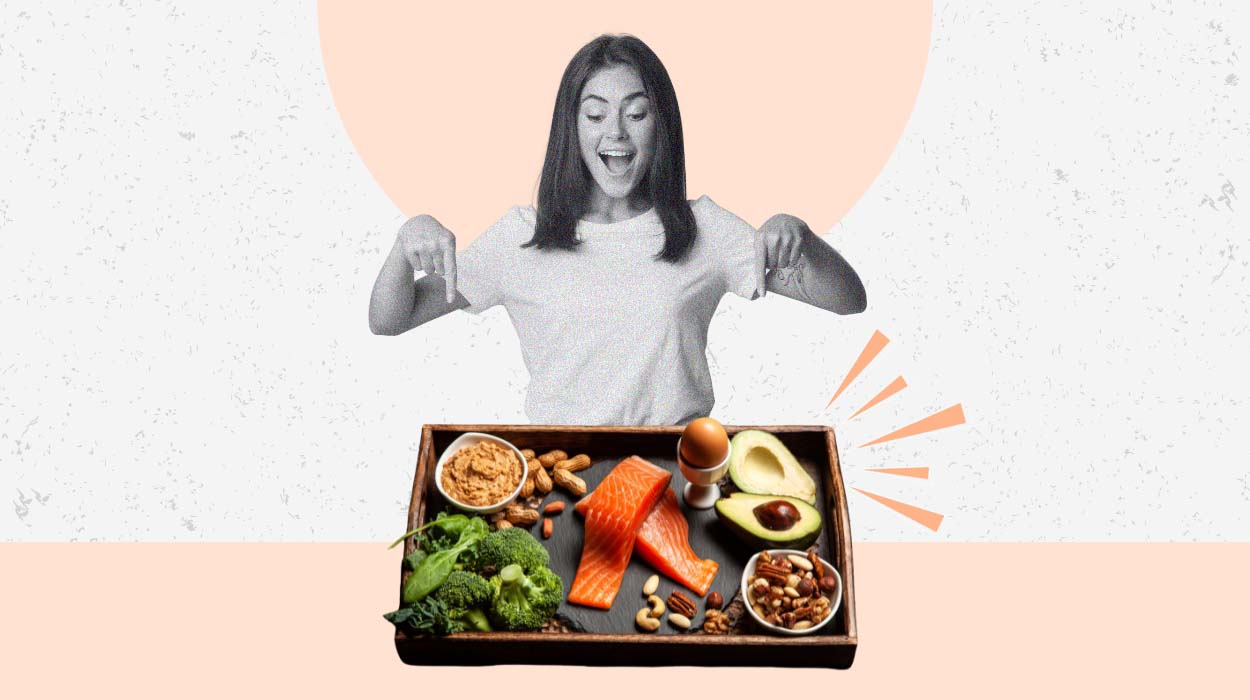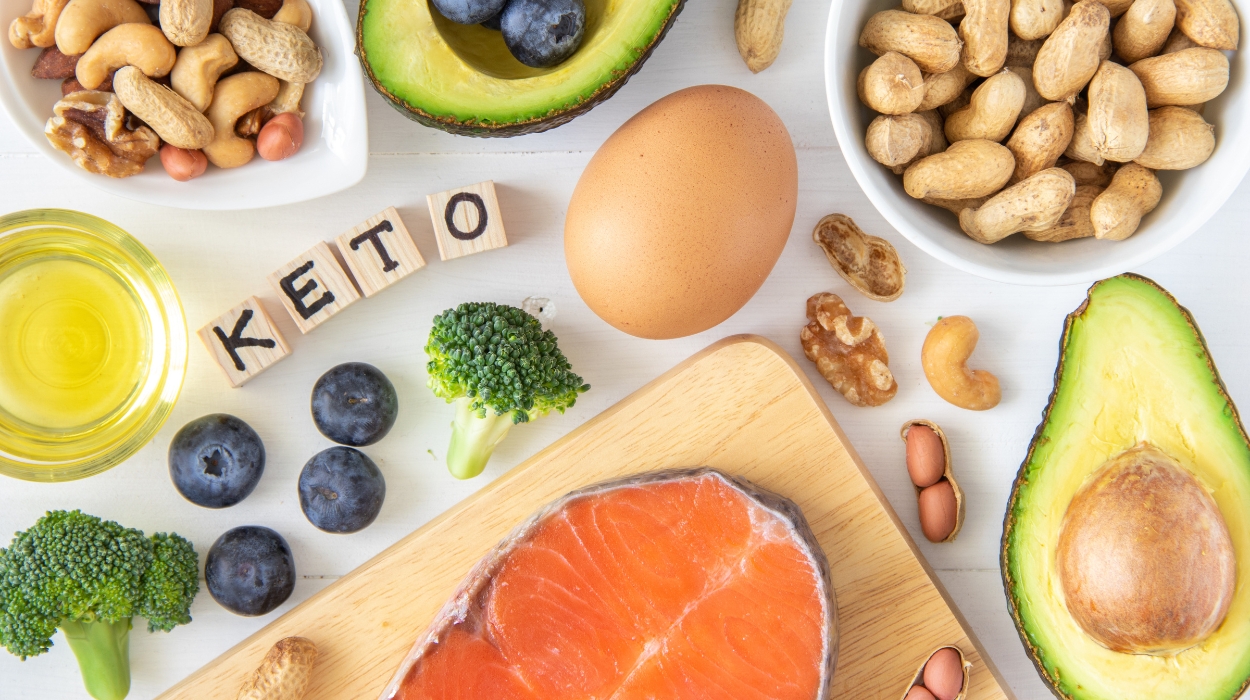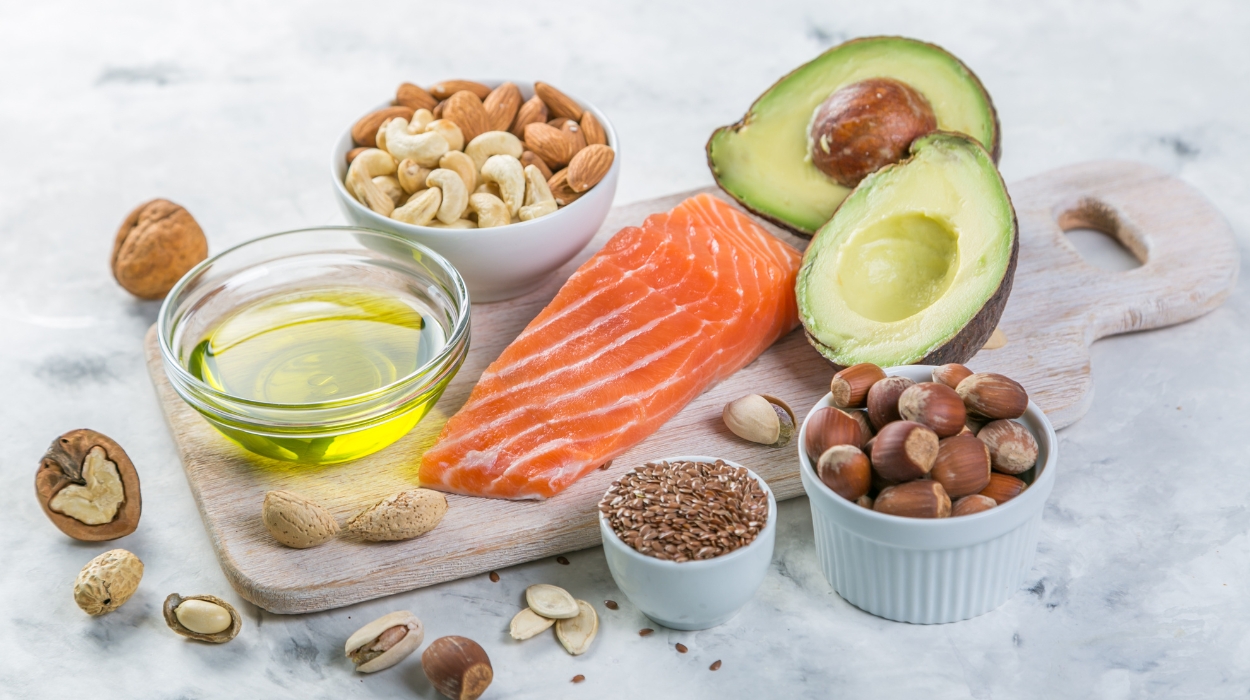 Expert's opinion
Expert's opinion
Expert's opinion
The article is a subjective view on this topic written by writers specializing in medical writing.
It may reflect on a personal journey surrounding struggles with an illness or medical condition, involve product comparisons, diet considerations, or other health-related opinions.
Although the view is entirely that of the writer, it is based on academic experiences and scientific research they have conducted; it is fact-checked by a team of degreed medical experts, and validated by sources attached to the article.
The numbers in parenthesis (1,2,3) will take you to clickable links to related scientific papers.
Keto Cheat Sheet 2024: Ketogenic Food List & Essential Steps

Unlock the power of the ketogenic diet and transform your body into a fat-burning machine. The keto diet, with its low-carbohydrate, high-fat approach, has taken the world by storm. Discover the secrets behind ketosis, where your body switches to burning fat for fuel, and explore the incredible health benefits it offers in this keto fast food cheat sheet article!
But beware! Don’t fall into the common pitfalls that can derail your progress. Learn the mistakes to avoid and get ready to embark on a journey to a healthier, leaner you.
Keto Diet Cheat Sheet For Beginners
A Great Sample Of Keto Cheat Sheet
If you’re looking for an example, here is a sample meal plan for keto dieters. Remember to consult your doctor or registered dietitian to tailor the meal plan to your specific needs and goals.
Day 1: A Day Of Nutrient-Rich Delights (approx. 1950 calories)
This meal plan offers a low-carb, high-fat approach to nutrition, which can help your body enter a state of ketosis. With a focus on lean proteins, healthy fats, and minimal carbohydrates, this plan is designed to support weight management and provide sustained energy throughout the day.
| Breakfast | |
| Large eggs | two |
| Fresh spinach | a half cup |
| mushrooms | a quarter cup |
| Coconut oil | a tbsp |
| Morning Snack | |
| Mixed nuts (almonds, walnuts, and pecans) | a small handful |
| Lunch | |
| Grilled chicken breast | six oz |
| Broccoli florets, sautéed in butter | a cup |
| Afternoon Snack | |
| Medium celery | two sticks |
| Almond butter | two tbsp |
| Dinner | |
| Baked salmon | six oz |
| Roasted asparagus | a cup |
| Side salad with mixed greens, dressed | |
| Olive oil and vinegar | two tbsp |
| Dinner | |
| Keto-friendly chocolate chia pudding made with almond milk and topped with raspberries | a serving |
Day 2: Unlock The Benefits Of Ketosis (approx. 2100 calories)
The plan offers a day of nourishing, Keto-friendly meals, and snacks to help you stay on track with your low-carb, high-fat lifestyle. By prioritizing whole foods and healthy fats, you can enjoy the benefits of ketosis while savoring delicious and satisfying meals.
| Breakfast | |
| Large eggs | three |
| Ghee | a tbsp |
| Sliced avocado | a half |
| Morning Snack | |
| Cheese | two slices |
| Cucumber | a half slice |
| Lunch | |
| Medium zucchini, spiralized into noodles | one |
| Pesto sauce | two tbsp |
| Grilled chicken breast | six oz |
| Afternoon Snack | |
| Hard-boiled eggs | two |
| Dinner | |
| Beef strips | six oz |
| Mixed vegetables (broccoli, bell peppers, and snap peas) | a cup |
| Coconut oil | two tbsp |
| Stir-fry seasonings (soy sauce, garlic, ginger, etc., to taste) |
| Dessert | |
| Sugar-free coconut milk ice cream | a serving |
| Sprinkle of crushed walnuts | two tbsp |
Day 3: Savor The Low-Carb Lifestyle (approx. 1710 calories)
This meal plan offers a day of delicious, low-carb, and high-fat eating to support your ketogenic lifestyle. By focusing on quality ingredients and balanced macros, you can enjoy a variety of satisfying meals and snacks while staying within your dietary goals.
| Breakfast | |
| Keto pancakes made with almond flour | two |
| Sugar-free syrup | two tbsp |
| Morning Snack | |
| Sliced bell pepper | a half |
| Guacamole | two tbsp |
| Lunch | |
| Drained tuna in water | a can |
| Mayonnaise | two tbsp |
| Diced celery | a quarter cup |
| Lettuce leaves for wrapping |
| Afternoon Snack | |
| Coconut milk yogurt | a serving |
| A handful of raspberries | 30g |
| Dinner | |
| Baked chicken thighs | two |
| Brussels sprouts sautéed in bacon fat | a cup |
| Season with salt, pepper, and garlic powder |
| Dessert | |
| Keto-friendly peanut butter cookies made with almond flour | two |
Adjust portion sizes and macronutrient ratios to meet your needs and consult with a healthcare professional or registered dietitian for personalized advice.
To find even more about ketogenic diet meal plans, check out this article!
Ketogenic Diet: What Is It?

The ketogenic diet[1] is a low-carbohydrate, high-fat diet that has gained significant popularity in recent years. The goal of the ketogenic diet is to shift the body’s metabolism into ketosis, where fat is used for fuel instead of carbohydrates.
In a typical diet, carbohydrates are the body’s primary source of energy. However, by severely restricting carbohydrate intake and increasing fat consumption, the body is forced to enter a state of ketosis. When following a keto regimen, the liver converts fat into ketones, which serve as an alternative fuel source for the body and brain.
The standard ketogenic diet involves reducing carbohydrate intake to 5-10% of total daily calories, while increasing fat intake to 70-75% of total daily calories. This is considered low carb. Protein intake is moderate, comprising about 20% of total daily calories. The net carbs should be kept under about 50 grams per day. By significantly reducing carbohydrates, the ketogenic diet should stabilize blood sugar levels and promote satiety.
This diet can also help you lose weight and burn fat. Medium-chain triglycerides (MCT)[2] can be a helpful addition to a ketogenic diet for quick energy in place of carbohydrates and potentially expedite weight loss. Learn more about the best MCT oils here!
While the ketogenic diet has shown promising results for weight loss and certain medical conditions, approach it with caution. The keto journey takes getting used to, but it can be done! Learn even more about the ketogenic diet here!
The Keto Diet’s Health Benefits
- Weight loss[3]: The ketogenic diet can lead to significant weight loss, primarily by promoting the burning of stored body fat for energy.
- Blood sugar control[4]: By minimizing carbohydrate intake, the ketogenic diet helps stabilize blood sugar levels, benefitting diabetes or insulin resistance.
- Improved mental focus[5]: The brain can effectively utilize ketones as an energy source, which may enhance cognitive function and mental clarity. Read more about how the ketogenic diet can be beneficial for brain health here!
- Reduced seizures[6]: The ketogenic diet has been used for decades as a therapeutic approach for individuals with epilepsy, particularly those who do not respond well to medication.
- Enhanced insulin sensitivity[7]: The ketogenic diet can improve insulin sensitivity, potentially benefiting individuals with metabolic syndrome or type 2 diabetes.
Note that individual responses to the ketogenic diet vary, and the diet may not be suitable for everyone.
Cheat Sheet For Keto Diet: Foods To Eat

- Healthy Fats: Avocado, avocado oil, coconut oil, olive oil, ghee, grass-fed butter, and fatty cuts of meat (e.g., bacon, lamb, and steak).
- Protein Sources: Eggs, chicken, turkey, beef, pork, fatty fish (e.g., salmon, sardines, and mackerel), and seafood.
- Low-Carb Vegetables: Spinach, kale, lettuce, broccoli, cauliflower, zucchini, asparagus, brussels sprouts, and cucumber.
- Nuts & Seeds: Almonds, walnuts, macadamia nuts, flax, chia, and pumpkin seeds.
- Dairy Products: Cheese (hard and soft varieties), heavy cream, sour cream, and full-fat yogurt (unsweetened).
- Berries: Strawberries, blueberries, raspberries, and blackberries (in moderation).
- Sweeteners: Stevia, erythritol, monk fruit, and small amounts of other sugar substitutes (avoid artificial sweeteners).
- Beverages: Water, unsweetened tea and coffee, bone broth, and unsweetened nut milk (e.g., almond or coconut milk).
- Herbs & Spices: Basil, oregano, rosemary, turmeric, cinnamon, cumin, and garlic (avoid spice blends with added sugars).
Learn more about the keto diet food lists!
Keto Cheat Sheet For Food Replacements
- Cereals > Chia Pudding.
- Vegetable oil > Coconut oil.
- Breads and wraps > Keto bread made with almond or coconut flour.
- Potatoes > Cauliflower mash.
- Rice and Grains > Cauliflower rice.
- Milk and Dairy > Unsweetened almond milk or coconut milk.
- Sweeteners > Stevia, erythritol, or monk fruit sweeteners.
Five Steps In Keto Diet Cheat Sheet For Beginners
Calculate Your Daily Caloric Requirement
To estimate your daily calorie needs, you can use various formulas that take into account factors such as age, gender, weight, height, and activity level. One commonly used equation is the Harris-Benedict equation, which provides a baseline estimate of your resting metabolic rate (RMR). From there, you can adjust the RMR based on your activity level to determine your total daily energy expenditure (TDEE).
Change Your Pantry
- Remove high-carbohydrate foods: Discard or donate items like grains, rice, pasta, sugary snacks, and processed foods. These items are not keto-friendly.
- Stock up on healthy fats: Replace unhealthy oils with options like coconut oil, olive oil, avocado oil, and grass-fed butter. These fats are crucial for maintaining ketosis.
- Include low-carb staples: Add items like almond flour, coconut flour, nuts, seeds, and nut butters to your pantry. They can be used as alternatives for high-carb ingredients.
Read Food Labels
Pay attention to nutritional labels and ingredients to identify hidden sources of carbohydrates and make informed food choices.
Practice Meal Planning And Preparation
Plan and prepare your meals in advance to ensure you have keto-friendly options readily available and avoid impulse eating. Meal prep will ensure that you have good healthy meals that have low carbs and healthy fats.
Monitor Ketone Levels
Monitoring ketone levels while on a ketogenic diet is crucial for maintaining your state of ketosis. Use urine strips to monitor ketone levels.
Five Mistakes You Should Not Make On A Keto Diet
When following a ketogenic diet, be aware of potential mistakes that could hinder your progress or impact your overall health. Here are some common mistakes to avoid:
Not Consuming Enough Fat
Not consuming enough fat on a ketogenic diet can hinder your ability to reach and maintain ketosis. Fat is a primary source of energy in this diet, and inadequate fat intake may result in low energy levels and difficulty sustaining the state of ketosis required for the diet’s benefits.
Neglecting Nutrient Variety
While it’s crucial to limit carbohydrates, don’t forget to include a variety of nutrient-dense foods in your diet. Focus on incorporating low-carb vegetables, healthy fats, and quality sources of protein to ensure you’re getting a range of essential nutrients.
Ignoring Hydration
Ketosis can lead to increased water loss, so it’s important to stay hydrated. Drink an adequate amount of water throughout the day to support bodily functions and prevent dehydration.
Not Monitoring Portion Sizes
Even when eating keto foods, portion control matters. Overeating high-fat foods can still lead to calorie excess and weight gain. Be mindful of portion sizes and track your macronutrients to maintain a proper balance.
Overeating Protein
Excessive protein consumption can disrupt ketosis as excess protein can be converted to glucose through a process called gluconeogenesis. Focus on moderate protein intake to prevent this issue.
Conclusion
The ketogenic diet is a low-carbohydrate, high-fat diet that shifts the body into ketosis, where it primarily burns fat for energy. It has shown potential benefits for weight loss, blood sugar control, reduced cravings, improved mental focus, and more.
However, it’s important to avoid certain mistakes while following the ketogenic diet, such as not consuming enough fat, neglecting nutrient variety, ignoring hydration, not monitoring portion sizes, and overeating protein.
By being mindful of these potential pitfalls and following a well-planned ketogenic meal plan, individuals can maximize the benefits of the diet and support their overall health and well-being. As always, consult with a healthcare professional or registered dietitian before making any significant dietary changes.
Frequently Asked Questions
The ketogenic diet is a low-carbohydrate, high-fat diet that aims to shift the body’s metabolism into a state called ketosis. In ketosis, the body uses fat for fuel instead of carbohydrates. By severely restricting carbohydrate intake and increasing fat consumption, the liver converts fat into ketones, which serve as an alternative energy source for the body and brain.
To estimate your daily calorie needs, you can use formulas that take into account factors such as age, gender, weight, height, and activity level. One commonly used equation is the Harris-Benedict equation, which provides a baseline estimate of your resting metabolic rate (RMR). From there, you can adjust the RMR based on your activity level to determine your total daily energy expenditure (TDEE).
The essential steps in the keto fast food cheat sheet for beginners are:
1. Calculate your daily caloric requirement using appropriate formulas.
2. Revamp your pantry by removing high-carbohydrate foods and stocking up on healthy fats, low-carb staples, non-starchy vegetables, and sugar substitutes.
3. Read food labels to identify hidden sources of carbohydrates and make informed choices.
4. Practice meal planning and preparation to ensure you have keto-friendly options readily available.
5. Monitor ketone levels using urine strips, blood ketone meters, or breath analyzers.
Some common mistakes to avoid on a ketogenic diet are:
1. Not consuming enough fat, which can hinder ketosis.
2. Neglecting nutrient variety by not incorporating a range of nutrient-dense foods.
3. Ignoring hydration, as ketosis can lead to increased water loss.
4. Not monitoring portion sizes, as overeating high-fat foods can lead to weight gain.
5. Overeating protein, as excess protein consumption can disrupt ketosis.
+ 7 sources
Health Canal avoids using tertiary references. We have strict sourcing guidelines and rely on peer-reviewed studies, academic researches from medical associations and institutions. To ensure the accuracy of articles in Health Canal, you can read more about the editorial process here
- O’Neill, B.J. and Raggi, P. (2020). The ketogenic diet: Pros and cons. [online] 292, pp.119–126. doi:https://doi.org/10.1016/j.atherosclerosis.2019.11.021.
- Vetrani, C., Verde, L., Savastano, S., Colao, A., Muscogiuri, G. and Barrea, L. (2023). Supplementation with medium-chain fatty acids increases body weight loss during very low-calorie ketogenic diet: a retrospective analysis in a real-life setting. [online] 21(1). doi:https://doi.org/10.1186/s12967-023-03880-7.
- A. Bruci, Tuccinardi, D., Tozzi, R., Balena, A., Santucci, S.C., Riccardo Frontani, Mariani, S., Basciani, S., Spera, G., Gnessi, L., Lubrano, C. and Watanabe, M. (2020). Very Low-Calorie Ketogenic Diet: A Safe and Effective Tool for Weight Loss in Patients with Obesity and Mild Kidney Failure. [online] 12(2), pp.333–333. doi:https://doi.org/10.3390/nu12020333.
- Zhou, C., Wang, M., Liang, J., He, G.-M. and Chen, N. (2022). Ketogenic Diet Benefits to Weight Loss, Glycemic Control, and Lipid Profiles in Overweight Patients with Type 2 Diabetes Mellitus: A Meta-Analysis of Randomized Controlled Trails. [online] 19(16), pp.10429–10429. doi:https://doi.org/10.3390/ijerph191610429.
- Yang, H., Shan, W., Zhu, F., Wu, J. and Wang, Q. (2019). Ketone Bodies in Neurological Diseases: Focus on Neuroprotection and Underlying Mechanisms. [online] 10. doi:https://doi.org/10.3389/fneur.2019.00585.
- Marzena Ułamek-Kozioł, Czuczwar, S.J., Januszewski, S. and Pluta, R. (2019). Ketogenic Diet and Epilepsy. [online] 11(10), pp.2510–2510. doi:https://doi.org/10.3390/nu11102510.
- Skow, S.L. and Rajesh Kumar Jha (2023). A Ketogenic Diet is Effective in Improving Insulin Sensitivity in Individuals with Type 2 Diabetes. [online] 19(6). doi:https://doi.org/10.2174/1573399818666220425093535.



